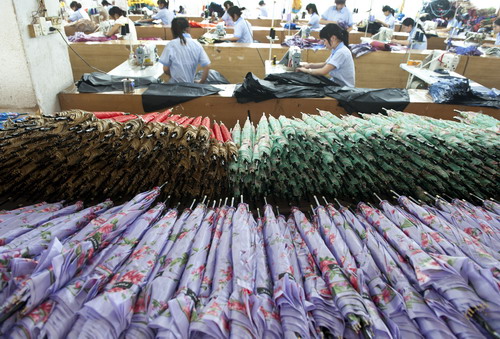行业新闻
IndustryDate:2025-04-12
In recent years, international businesses have faced increasing uncertainty due to shifts in US tariff policy. For companies involved in the custom umbrella export to the US, these policy changes have introduced a series of challenges that affect pricing, competitiveness, and logistics. As umbrellas are a common consumer good—often used for promotional purposes as branded umbrellas—the impact of tariffs has reached not only manufacturers but also marketing agencies and retailers.

One of the most significant issues in custom umbrella export to the US is the increase in import duties. Under recent rounds of US-China trade disputes, various consumer goods, including umbrellas, were subjected to additional tariffs ranging from 10% to 25%. These additional costs can significantly affect the profitability of umbrella exports, especially for small and medium-sized custom manufacturers.
Another problem is the complexity of HS (Harmonized System) codes used in international trade. Different types of umbrellas—such as folding umbrellas, golf umbrellas, or automatic open umbrellas—may be classified under slightly different codes, each with distinct tariff rates. Misclassification can lead to fines or shipment delays, adding further risk to the custom umbrella export to the US.
Because customized umbrellas often involve higher production costs due to printing, design, and branding, the added tariff burden is harder to absorb. For instance, a branded umbrella used in corporate promotions may already involve premium materials and complex printing methods like digital or thermal transfer. When tariffs are applied, the overall landed cost of such a product can become uncompetitive in the US market.
Exporting custom goods to the US requires meticulous documentation, including certificates of origin, design declarations, and possibly patent or copyright information if the umbrella features unique branded content. Delays or rejections at customs can occur if documentation does not comply with the latest regulations under the US tariff policy.
To overcome these obstacles and ensure continued success in the custom umbrella export to the US, businesses can take several strategic steps:
Work with logistics partners to reduce shipping costs, consolidate shipments, or explore free trade zones where goods can be stored or processed without incurring tariffs immediately.
Some companies have moved partial production from China to countries with more favorable trade terms with the US, such as Vietnam or Indonesia. This can reduce or even eliminate some tariffs while maintaining the same custom umbrella export standards.
Focusing on high-quality branded umbrella products with unique designs and marketing appeal can justify higher pricing in the US market. Customers may be willing to pay more for well-designed, functional, and fashionable umbrellas.
Closely monitor updates in the US tariff policy and consult with trade lawyers or customs brokers to ensure full compliance. Using digital platforms to track tariff changes can help businesses stay agile.

The custom umbrella export to the US is currently shaped by complex tariff regulations, yet with the right strategies, manufacturers and exporters can maintain strong business performance. By optimizing supply chains, improving compliance, and emphasizing product differentiation through design and branding, businesses can continue to thrive despite evolving US trade policies.

Sweep more wonderful information
E-mail:greensoure@foxmail.com Address: First Floor, No. 28, Hebian Street, Hebian Village, Helong Street, Baiyun District, Guangzhou City
Copyright 广州网站建设 Custom_Umbrella
Custom_Umbrella